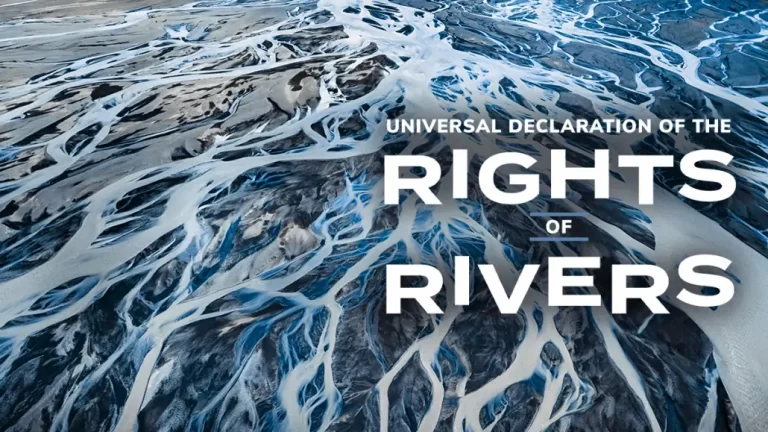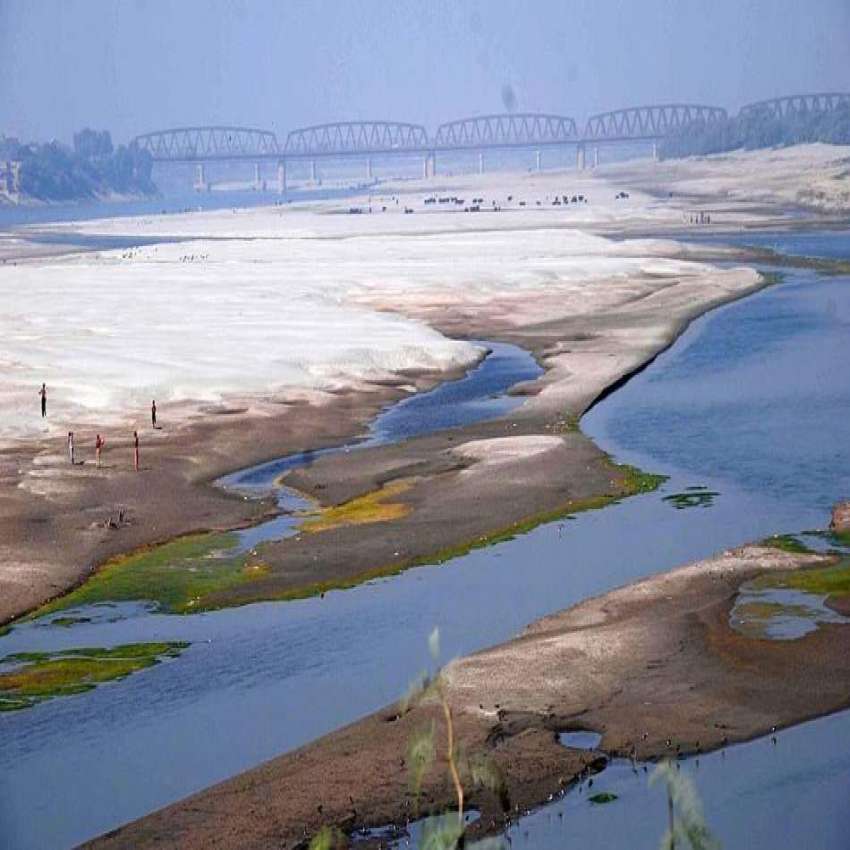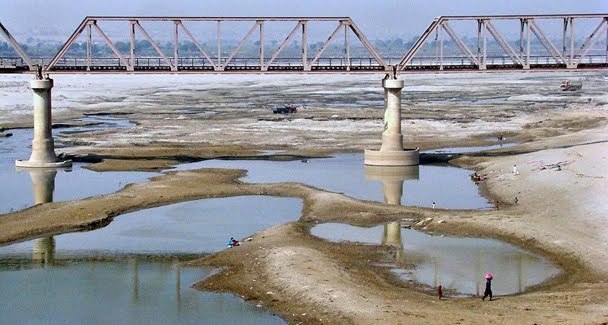
Rights of Rivers are part of the rights of nature which can be safeguarded when humans will stop extractive relations with nature
By Maria Memon and Dr. Rafique Wassan
In the current Anthropocene epoch, the planet Earth has experienced an unprecedented crisis in the form of climate and ecological catastrophe, depletion of nature, water, land, and mineral resources as well as the urban life and infrastructures which are fraught with devastating living conditions. Of late, social science and humanities researchers and scholars working within the framework of the critical theory of nature have taken account of the planetary crisis in the light of human capitalist-centric development models in the current age of the Anthropocene. In this light, the most basic question is posed to contest the human-nature relationship in the Anthropocene age which is marked by exploitation and control of nature. Carl Cassegard, Professor in the Department of Sociology and Work Science, University of Gothenburg, Sweden, in his seminal book Toward a Critical Theory of Nature: Capital, Ecology, and Dialectics has drawn attention to the capitalist social forms that determine human relationship with nature. In the same vein, Belgian anthropologist Lieselotte Viaene has presented incredible scholarly work on the Rights of Nature (RoN) and rivers in the light of the Anthropocene catastrophe. Notably, the Right of Nature (RoN) concept presented by Lieselotte Viaene (2022:187) is informed by the legal education framework and therefore calls attention to ‘granting legal personhood to nature’ especially rivers.
Experts are calling for granting legal personhood to nature, especially the rivers
Having an interest in researching environmental crisis and climate change disaster in the Anthropocene, in the preparation of this coproduced article, we take inspiration from critical conceptual tools such as the Rights of Nature (RoN), and critical theory of nature which are elevated in the aforementioned scholarly work. We understand that the calling of attention to the Rights for Nature (RoN) concept is a potentially powerful framework to engage in a meaningful dialogue on the protection of nature and the environment and highlight advocacy for the ecology sustenance-based development model which breaks free from the anthropocentric approach. Recognizing the rights of nature such as rivers, lakes, delta, oceans, coastal areas as well as land, mountains, forests, plants, and animals having legal personhood status appears intriguing to take forward in a broad spectrum the advocacy for climate justice action and adaptation. It is noteworthy that in recent years this new approach to the rights of nature that calls for the recognition of rivers to have their legal rights in terms of protection has started gaining momentum in different regions of the world. In 2017, the New Zealand government granted the Whanganui River personhood status. This means the Whanganui River has been recognized to have a status of living beings like persons. The legal personhood status of the Whanganui River also aims to highlight the idea of protecting the natural water resources for future generations of indigenous communities of New Zealand whose land resources were occupied during white European colonial settlement. This is to also note that in 2014, Urewera National Park the ancestral home of the Tuho’e people in the New Zealand was first granted the status of legal entity. And, in 2018, Mount Taranaki, an ancient stratovolcano which has been sacred to the indigenous tribes in New Zealand was granted the legal rights as a person. In India, our neighboring country, the River Ganga and Yamuna have also achieved the status of legal personhood from the High Court of Uttrakhand. It seems remarkable to recall Professor Christopher Stone in the USA who has also been a chief exponent of environmental advocacy and legal protection of nature. In fact, in the 1970s, it was Professor Christopher Stone who first introduced the concept of ‘environmental personhood’.
 The legal rights of the river are practiced through appointing the representatives of indigenous tribes and the government. They speak for the legal personhood of the rivers. In that regard, what is remarkable to understand is that for the indigenous tribes of New Zealand such as Maori, it is the intimate and sacred human relationship with the natural world that matters. For this reason, it is the duty of the community to protect the landscape they inhabit. In the sacred relationship, the river has the role of procreation in the lives of indigenous tribes. According to their beliefs, humans and water are entwined. So, when it comes to harming the river it is akin to harming the tribe. The indigenous beliefs clearly illustrate to foreground the idea of the legal right of the river as a legal person in the indigenous tribes of New Zealand. Any kind of abuse or threat to river water such as pollution or illegal activity can be penalized. In that case, the rivers have a legal right to sue against abuses and threats to it. This points to the way humans can save nature once they tend to develop sacred relationship as well as grant legal personhood status. The rights of nature can be safeguarded when humans will stop extractive relations with nature. It is by thinking and acting through the framework of the Rights of Nature (RoN) as a legal personhood the protection of nature and the broader cause of climate action can be realized in true spirit. For instance, The Universal Declaration of River Rights illustrate five core values which could be adapted as a guiding framework to elevate the status of rivers as legal persons across the world. The core values to safeguard the rights of river stress on the right to flow, functional ecosystem, pollution free rivers, sustainable aquifers, and regeneration and restoration of rivers (Heal Earth 2022, Youtube Video). The legal personhood status ensures the rights of the river like a living entity. This approach empowers the rivers by assigning legal safeguards and actions.
The legal rights of the river are practiced through appointing the representatives of indigenous tribes and the government. They speak for the legal personhood of the rivers. In that regard, what is remarkable to understand is that for the indigenous tribes of New Zealand such as Maori, it is the intimate and sacred human relationship with the natural world that matters. For this reason, it is the duty of the community to protect the landscape they inhabit. In the sacred relationship, the river has the role of procreation in the lives of indigenous tribes. According to their beliefs, humans and water are entwined. So, when it comes to harming the river it is akin to harming the tribe. The indigenous beliefs clearly illustrate to foreground the idea of the legal right of the river as a legal person in the indigenous tribes of New Zealand. Any kind of abuse or threat to river water such as pollution or illegal activity can be penalized. In that case, the rivers have a legal right to sue against abuses and threats to it. This points to the way humans can save nature once they tend to develop sacred relationship as well as grant legal personhood status. The rights of nature can be safeguarded when humans will stop extractive relations with nature. It is by thinking and acting through the framework of the Rights of Nature (RoN) as a legal personhood the protection of nature and the broader cause of climate action can be realized in true spirit. For instance, The Universal Declaration of River Rights illustrate five core values which could be adapted as a guiding framework to elevate the status of rivers as legal persons across the world. The core values to safeguard the rights of river stress on the right to flow, functional ecosystem, pollution free rivers, sustainable aquifers, and regeneration and restoration of rivers (Heal Earth 2022, Youtube Video). The legal personhood status ensures the rights of the river like a living entity. This approach empowers the rivers by assigning legal safeguards and actions.
The rivers need rehabilitation and regeneration for the well-being of the planet
Thus, granting legal personhood to nature is rooted in the recognition that ecology and ecosystem including rivers have a vital role on the planet Earth, and that the Rivers should be protected from environmental degradation and pollution. The rivers need rehabilitation and regeneration for the well-being of the planet. If water is polluted and endangered it eventually cause a threat to life on earth. Recognizing the legal rights of rivers is a way to ensure their preservation and safeguard the climate and ecology of Earth. Rivers play an essential role in the health of the ecosystem, protect biodiversity, and habitat and provide nutrients to numerous species. Moreover, it is essential for the fertility of soil and agro-ecology.
Rights of Nature (RoN) advocacy and Indus River
We have discussed above a few examples of granting the legal rights of rivers in New Zealand and neighboring India. In the writing of this research article, we specifically turned to look at the status of environmental advocacy on the rights of nature and the Indus River in particular. The River Indus in Pakistan which is the main source of agriculture and livelihoods has received much attention in public forums on the issues of environmental degradation and pollution as well as the construction of mega irrigation development projects and the destruction of the Indus Delta and biodiversity such as mangrove forests and irrigated land. In this regard, the Rights of Nature (RoN) lens has special relevance when it comes to addressing the environmental crisis of the Indus River. It may be presumed that in Pakistan the voice on the issue of the environmental degradation of the river Indus indicates the ecological awareness to protect the rights of the river. Particularly, one may witness the vibrant role of civil society in Sindh raising its voice on the protection of the river Indus.

Government in Pakistan is not cognizant and conscious of the RoN framework. However, civil society has expressed a remarkable voice on safeguarding the rights of Indus River
I, the firs author of this coproduced article, spoke to Dr. Rafique Wassan, a faculty member at the Department of Anthropology and Archaeology, University of Sindh, Jamshoro, Pakistan, in order to seek his opinion on the presence of Rights of Nature (RoN) advocacy on river Indus. Dr. Wassan has been engaged in researching art activism and the environment in Pakistan, especially in the Sindh province. I asked him how one may look at the presence of Rights of Nature (RoN) advocacy framework on the river Indus. Dr. Rafique Wassan was of the view that the government in Pakistan is not cognizant and conscious of the RoN framework. However, civil society has expressed a remarkable voice on safeguarding the rights of Indus River and one may see the vibrant role of civil society and indigenous communities in the Indus Delta in highlighting this debate. Dr. Wassan also pointed out the activist role of artists in Sindh such as Saif Samejo, founder of The Sketches Sufi music band and Lahooti Melo, among other poets and writers. They express their voice for the protection of the river Indus. Moreover, Dr. Wassan shared that in Pakistan the Seraiki language poet Dr. Ashu Lal’s creative cultural expression contains a powerful voice for the protection of the Indus River which can be illustrated as a case in point along the lines of the Rights of Nature (RoN) discourse.
Since the Rights of Nature (RoN) framework places emphasis on the legal rights and personhood of rivers, it was pertinent to seek an opinion from a faculty member of the Law Department. In this regard, we spoke to Dr. Sardar Shah who teaches at the Faculty of Law, University of Sindh, Jamshoro, Pakistan. Dr. Shah has a special interest in environmental law. I was interested to seek his opinion on the awareness of the RoN framework in Law education. Dr. Sardar Shah pointed out that many subjects are introduced in L. L.B program which also includes a course on Environmental Law, but special attention is not accorded to RoN. Dr. Sardar Shah stated: “It is sad to take note of the fact of the matter that in Law education we have no sense of initiating new things and ideas. So, this is the reason our lawyers do not focus on it. Here we have a lack of and no interest in doing new research and innovation. Except for only limited research work, most of the professors at the university do research to grab job promotions.”
Dr. Shah was of the opinion that the majority of lawyers opt for professional law practice and only a few joins academia. In Dr. Shah’s view, Law professionals’ low priority accorded to academic teaching and research is one of the main reasons to engage in introducing new research-based concepts in the field of Law. He explained: “In Pakistan, the Law teaching departments and faculties continue to teach old fashioned traditional laws. They do not take efforts to change the law curriculum. It’s the issue of implementation of change in law education and practice. In the law education and profession in Pakistan, it is generally considered that it is only to become an advocate in the strict technical sense to deal with civil and criminal cases in the courts of law and to work for paid clients. In our country there is no awareness in the law education that the advocates or law professionals can work in the field of environmental law”.
To sum up, the discussion taken up here in this research article draws attention to the crucial concept of the Rights of Nature (RoN) in the context of granting legal rights to rivers and tends to present advocacy implications to address the environment and climate change crisis on the planet Earth. We understand that the Rights of Nature framework in the current Anthropocene age has great potential to fight for nature rights on the planet Earth.
_________________
 Author: Maria Memon is a BS final year student of anthropology at the Department of Anthropology and Archaeology, University of Sindh, Jamshoro, Pakistan. Email: mariamansoor78611@gmail.com
Author: Maria Memon is a BS final year student of anthropology at the Department of Anthropology and Archaeology, University of Sindh, Jamshoro, Pakistan. Email: mariamansoor78611@gmail.com
 Dr. Rafique Wassan is a faculty member at the Department of Anthropology and Archaeology, University of Sindh, Jamshoro, Pakistan. Email: rafique.wassan@usindh.edu.pk
Dr. Rafique Wassan is a faculty member at the Department of Anthropology and Archaeology, University of Sindh, Jamshoro, Pakistan. Email: rafique.wassan@usindh.edu.pk
[Note: This is coproduced research work. Maria Memon, the first author, sought the mentorship of Dr. Rafique Wassan, a faculty member at the Department of Anthropology and Archaeology, University of Sindh, Jamshoro]